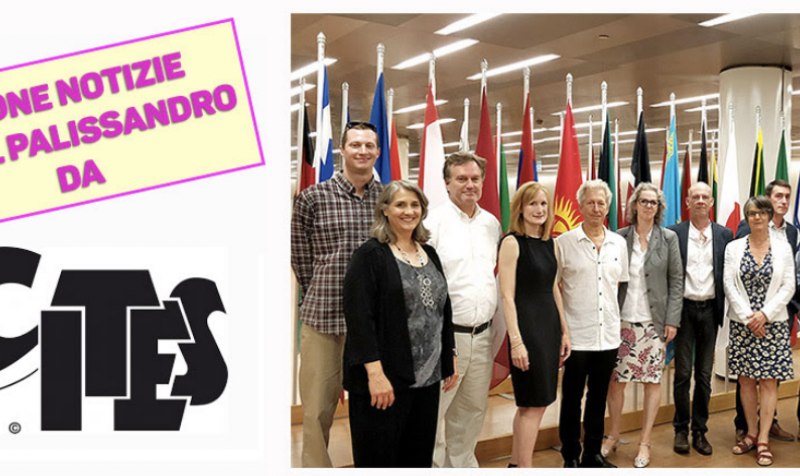CITES: ridotti fortemente i requisiti di autorizzazione per l'import/export del palissandro

L'azione ha invertito efficacemente la delibera del 2016 che richiedeva la concessione di un permesso per ogni strumento musicale esportato dai produttori, come pure per gli strumenti trasportati oltre i confini nazionali per uso personale.
In base alle nuove revisioni approvate nell’”Annotazione n. 15”, che riguarda il commercio di palissandro, i produttori di strumenti saranno ancora tenuti a garantire i permessi CITES per l’importazione di tronchi, pannelli ed impiallacciature di palissandro non finiti. Tuttavia, strumenti completi, parti di strumenti e accessori contenenti palissandro possono ora essere spediti in tutto il mondo senza la necessità di alcun documento CITES. I musicisti potranno inoltre trasportare i propri strumenti oltre confine senza la necessità di alcuna autorizzazione.
I produttori, la NAMM, la Lega delle Orchestre Americane, CAFIM la confederazione dell'industria musicale europea, l'Associazione internazionale del violino e dei produttori di archi, e l'Associazione francese di strumenti musicali, ...
l'articolo continua...
al fine di rivedere l'Annotazione n. 15, negli ultimi tre anni hanno organizzato gruppi di lavoro di esperti internazionali, presentato alle commissioni Cites documenti, analisi e testimonianze che motivavano la richiesta di esenzione dell'industria dello strumento musicale da questa normativa. Anche le organizzazioni doganali in tutto il mondo, improvvisamente sovraccariche di richieste di autorizzazione, hanno sostenuto la razionalizzazione delle regole del palissandro.
Le normative Cites sul palissandro erano entrate in vigore nel gennaio 2017, sorprendendo l'industria musicale e rallentando in modo significativo il commercio globale di chitarre, fiati e vari strumenti a corda. Se da un lato i grandi produttori, Fender, Gibson, Martin e Taylor inclusi, si erano affrettati a sviluppare protocolli di conformità e a gestire i nuovi requisiti di autorizzazione, dall’altro molti piccoli produttori e liutai avevano semplicemente abbandonato i mercati di esportazione.
Frank Untermyer, direttore approvvigionamenti di Martin Guitars: “l’impegno amministrativo per la mia azienda era sproporzionato".
Scott Paul, direttore della sostenibilità delle risorse naturali della Taylor Guitars: “il regolamento sul palissandro è stato implementato con troppa fretta e ha fatto sì che le burocrazie di tutto il mondo emettessero una quantità oscena di permessi."
Come ricorderai, le norme sul palissandro erano nate dalle preoccupazioni per l'eccessiva raccolta di palissandro, stimolata dalla crescente domanda in Cina di mobili costruiti con questo legno. Tuttavia, il comitato Cites non aveva valutato appieno che queste norme avrebbero gravato pesantemente sui produttori di strumenti musicali e sui musicisti. Cites ora è stata ricettiva nei confronti dei produttori di strumenti musicali grazie alla solida documentazione di approvvigionamento responsabile del legno presentata dalla nostra commissione. Nella decisione ha avuto inoltre un peso importante il fatto che l'industria della musica globale rappresenti solo un decimo dell’uno percento del consumo di palissandro.
Il voto CITES a Ginevra è una chiara vittoria per l'industria musicale. Tutti coloro che commerciano in chitarre, strumenti a corda, fiati e persino pianoforti (il palissandro è spesso usato nei martelletti per pianoforti) sono stati liberati da un pesante onere amministrativo.
Lo splendido risultato conseguito incoraggia questo ormai compatto e rodato gruppo internazionale a proseguire in questa direzione per affrontare, con la stessa determinazione, attenzione e rispetto per l'ambiente, le nuove sfide a cui il mondo dello strumento musicale dovrà far fronte.
Claudio Formisano
Presidente CAFIM Italia
Music Trades official website
Nella foto (sx/dx): David Eynck, Paul Reed Smith Guitars; Cindy Squires, International Wood Products Association; Scott Paul, Taylor Guitars; Heather Noonan, League of American Orchestras; Frank Untermyer, C.F. Martin & Co., Inc.; Betty Heywood, NAMM; Jacques Carbonneaux and Fanny Reyre, French Musical Instrument Organization; Michael Jousserand, Confederation of European Music Industries; Rob Garner, Forest Based Solutions; John Bennett, International Association of Violin and Bow Makers; Mike Bayer, Fender Musical Instruments Corporation.
........................................................................................................................................................................
CITES Lifts Rosewood Permitting Requirements
Industry lobbying effort succeeds in reducing burdensome paperwork while affirming responsible sourcing of tonewoods.
________________________________________
THE MUSICAL INSTRUMENT INDUSTRY cheered when the Convention on International Trade in Endangered Species (CITES) voted at its 18th Congress of Parties held August 18 in Geneva, Switzerland to dramatically reduce the permit requirements for cross-border shipments of instruments containing rosewood. The move effectively reversed a 2016 ruling that required securing an export permit for every instrument exported by manufacturers, as well as instruments carried across national borders for personal use.
Under the newly approved revisions to “Annotation 15,” which covers trade in rosewood, instrument manufacturers will still be required to secure CITES permits for all unfinished imported rosewood logs, boards, and veneers. However, completed instruments, instrument parts, and accessories can now be shipped globally without the need for any CITES paperwork. Individuals will also be able to transport their instruments across borders without the need for permits.
CITES was receptive to
instrument makers’ plea for relief
"because we have a solid record of
responsibly sourcing wood."
The CITES vote, one of the rare instances when the organization actually reduced permitting, was prompted when instrument makers and associations including NAMM, the League of American Orchestras, CAFIM, the European music industry umbrella group, the International Association of Violin and Bow Makers, and the French Musical Instrument Association lobbied CITES to revise Annotation 15 for the past three years. Global customs organizations, overburdened by the permitting requirements, also advocated for streamlining the rosewood rules. In the U.S. alone, the 2016 regulations swamped the Fish and Wildlife Service, as CITES permit requests more than tripled to 60,000 annually.
The CITES rosewood regulations were abruptly put into place in January 2017, taking the music industry by surprise and significantly slowing global trade in guitars, woodwinds, and various stringed instruments as manufacturers scrambled to develop compliance protocols. Larger producers including Fender, Gibson, Martin, and Taylor had the scale to manage the new permitting requirements, but still struggled. Frank Untermyer, supply chain director at Martin Guitars, said the administrative burden on his company “could not be overstated.” Scott Paul, director of natural resource sustainability at Taylor Guitars, added that the rosewood regulation was hastily drafted and caused bureaucracies around the world to issue “an obscene amount of permits.” Smaller manufacturers and individual luthiers simply abandoned export markets.
"It’s likely that CITES may consider
other important wood species.
We need to remain engaged and vigilant."
The rosewood regulations were prompted by concerns of over-harvesting tropical hardwood forests, spurred by the surging demand for rosewood furniture in China. However, the CITES committee was unaware of the fact that their permitting regime placed serious burdens on instrument makers and performers. Paul indicated that CITES was receptive to the instrument makers’ plea for relief “because we have a solid record of responsibly sourcing wood, and because we willingly supported permitting on unfinished wood.” The fact that the music industry accounts for approximately one tenth of one percent of rosewood consumption also had some bearing.
The CITES vote in Geneva is an unalloyed victory for the music industry. All those who trade in guitars, stringed instruments, woodwinds, and even pianos (rosewood is often used in piano hammers) have been freed from a cumbersome administrative burden. However, Paul says the industry shouldn’t get complacent. “It’s likely that CITES may consider other important wood species,” he says. “We need to remain engaged and vigilant.”
Successfully lobbying CITES in Geneva (l-r) David Eynck, Paul Reed Smith Guitars; Cindy Squires, International Wood Products Association; Scott Paul, Taylor Guitars; Heather Noonan, League of American Orchestras; Frank Untermyer, C.F. Martin & Co., Inc.; Betty Heywood, NAMM; Jacques Carbonneaux and Fanny Reyre, French Musical Instrument Organization; Michael Jousserand, Confederation of European Music Industries; Rob Garner, Forest Based Solutions; John Bennett, International Association of Violin and Bow Makers; and Mike Bayer, Fender Musical Instruments Corporation.
Leggi anche
Podcast
Album del mese

Giacomo Baldelli
Adesso Potete Applaudire
Arcana Edizioni
La musica contemporanea è spesso percepita come ostica, difficile. Altrettanto spesso, però, cela nell’ascoltatore il timore di allontanarsi dalla comfort-zone,...

Jeff Wagner
lways Moving: The Strange Multiverse of Voïvod
Radical Research
Jeff Wagner pubblica Always Moving: The Strange Multiverse of Voïvod ed è la narrazione appassionata e appassionante del viaggio sonoro della prog metal canadese attraverso...

Van Morrison
Remembering Now
Virgin Music Group Self
Chi si chiede cosa possa dire di nuovo un leone come Van Morrison alla soglia delle ottanta candeline e con ben 47 album in studio...





